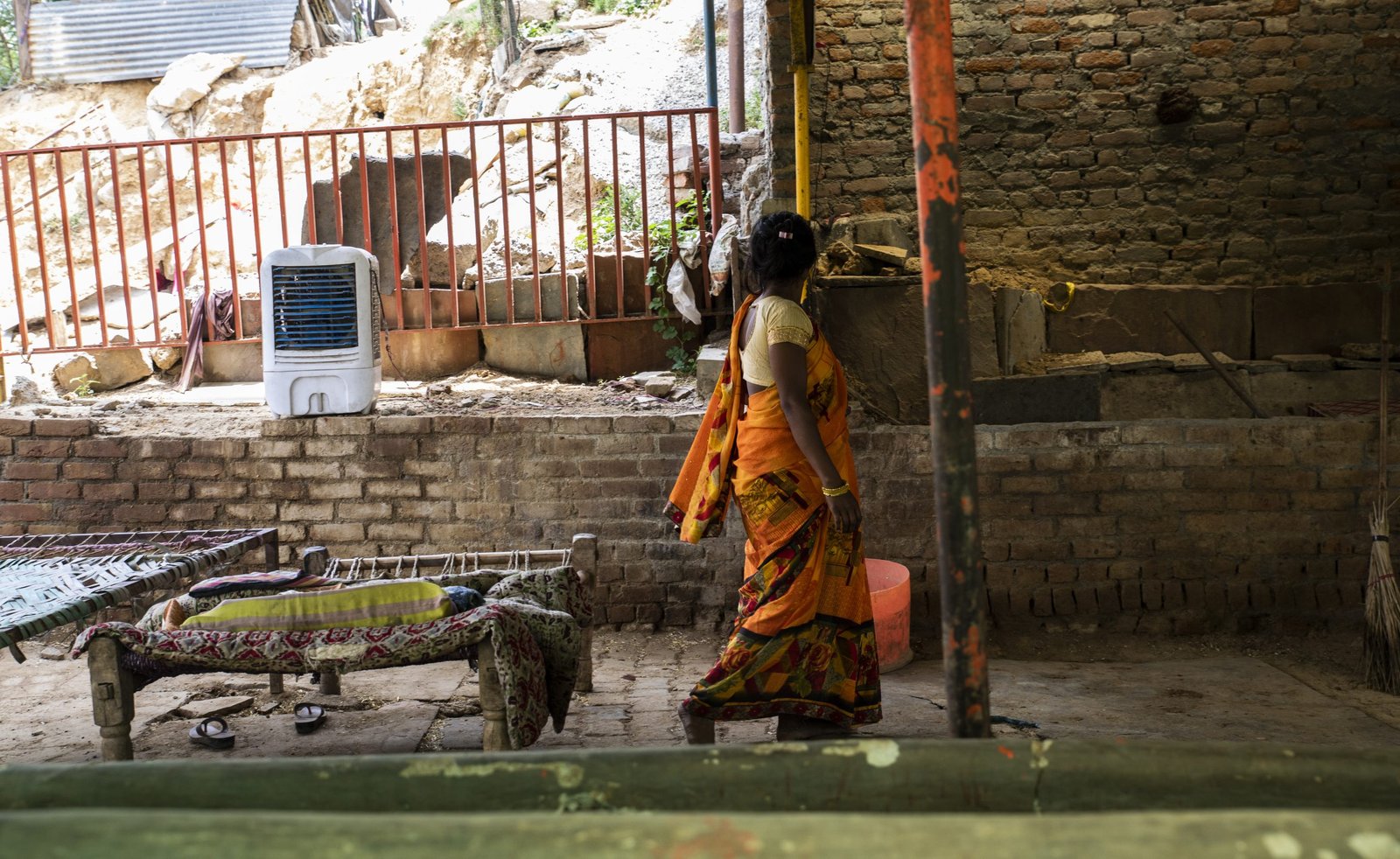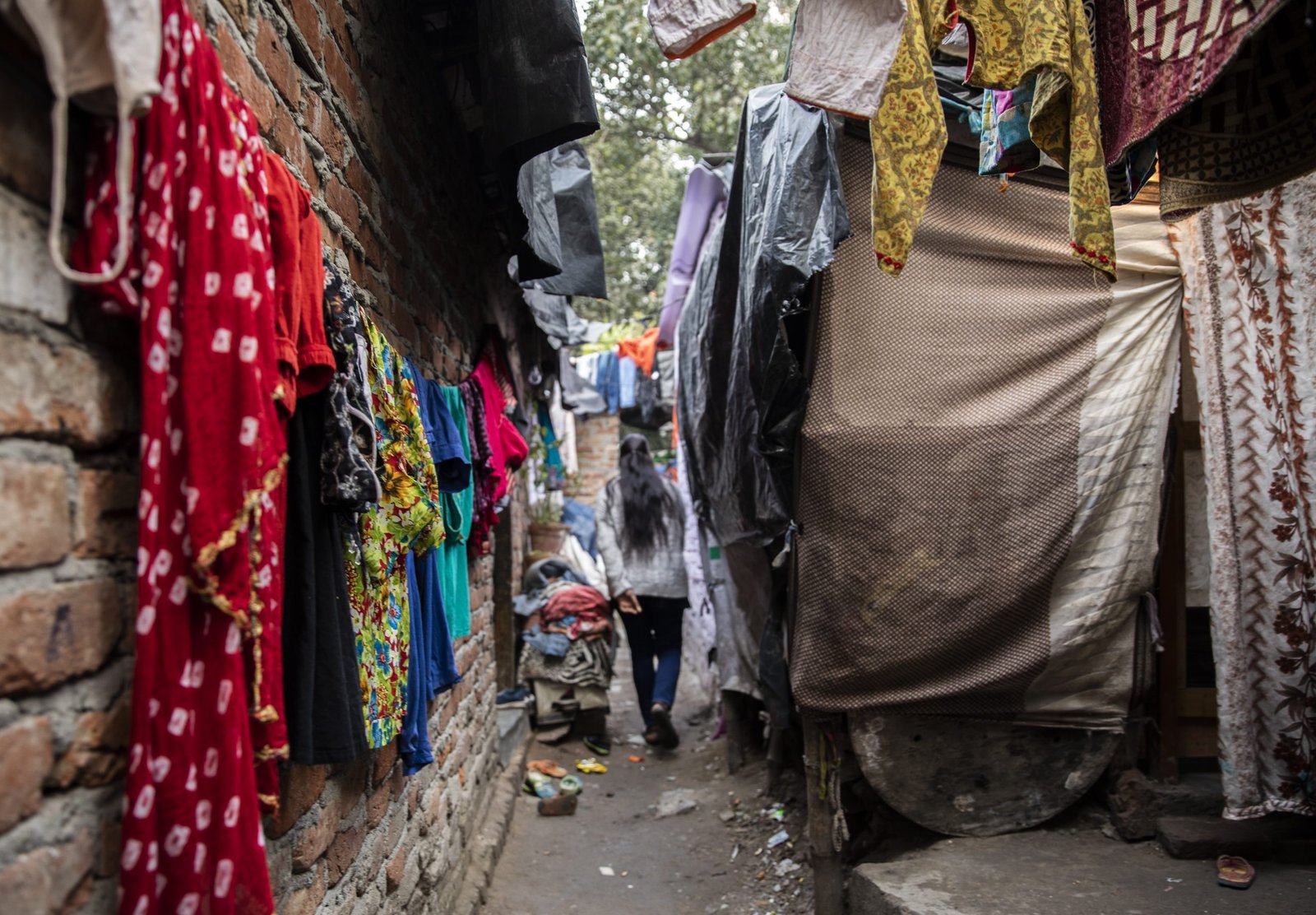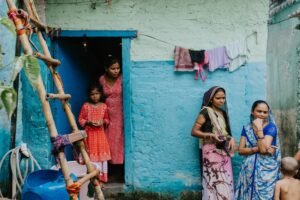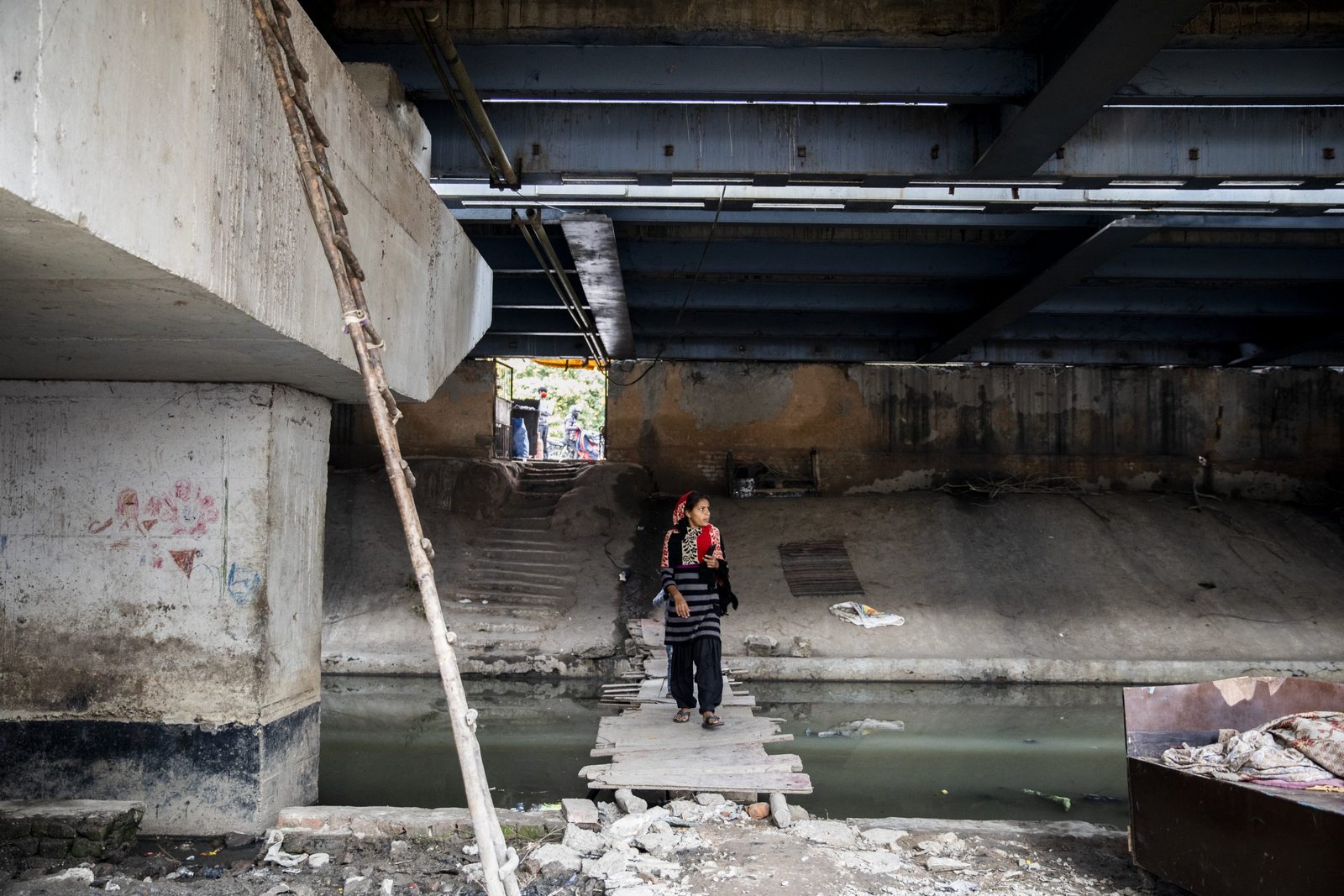
On a chilly winter night in Delhi, Rinky* felt someone touching her from behind when she was trying to sleep. She is a 19-year-old with a disability who lives on the footpath and makes a living by selling flowers at traffic checkpoints.
Pakhi* witnessed her house being razed to the ground, she couldn’t stop crying as her family of six was left without a roof over its head during the monsoon.
Raju* feels helpless when it starts raining, and his basti gets flooded with drain water and becomes a cesspit of diseases and chaos.
Omkar* was unable to take the final exam of his Class 12 board exams as the authorities decided to displace his family and other basti residents from their houses that very day.
Ramanuj* has been waiting patiently to be rehabilitated to a resettlement colony. With tears in his eyes, he says, “Agle Diwali tak hum iss jagah se nikal payenge na Ma’am? (Will we be able to move out from here and shift to the resettlement colony before next Diwali?)” Ramanuj and the residents of his basti have an order for rehabilitation to a resettlement colony, but it has not been implemented for three whole years.
In our developing economy, thousands of people live under the constant fear of being displaced from their houses and losing their hard-earned belongings and livelihoods overnight. Many spend their entire lives living on the streets without a roof over their heads, barely surviving due to the lack of basic necessities like sanitation and clean drinking water. Illegal and sudden evictions adversely affect the safety and security of the residents of these settlements, especially that of adolescent girls and women who are more susceptible to sexual violence and abuse.
Promoting Housing Rights of Slum Residents
iProbono works with its panel lawyers to provide quality pro bono legal assistance in cases of illegal eviction to help people access basic services like water, sanitation, electricity and other necessities. The process involves fact-finding, collation of information and paperwork, advocacy efforts with authorities, and drafting and filing of petitions in the court. In the past two years, our interventions have protected around 1,050 residents of these settlements from becoming homeless.
In July 2021, in the middle of the pandemic, iProbono’s intervention prevented the eviction of approximately 600 residents of the Kashmere Gate metro parking basti. Later, in January 2022, during the third wave of the pandemic, which saw unexpected rains and a brutal winter, our timely intervention saved around 200 individuals from the Gadia Lohar community in Manglapuri from being homeless. Success in housing cases becomes possible only with immediate intervention and efficient collaboration, both in the field and before the court.
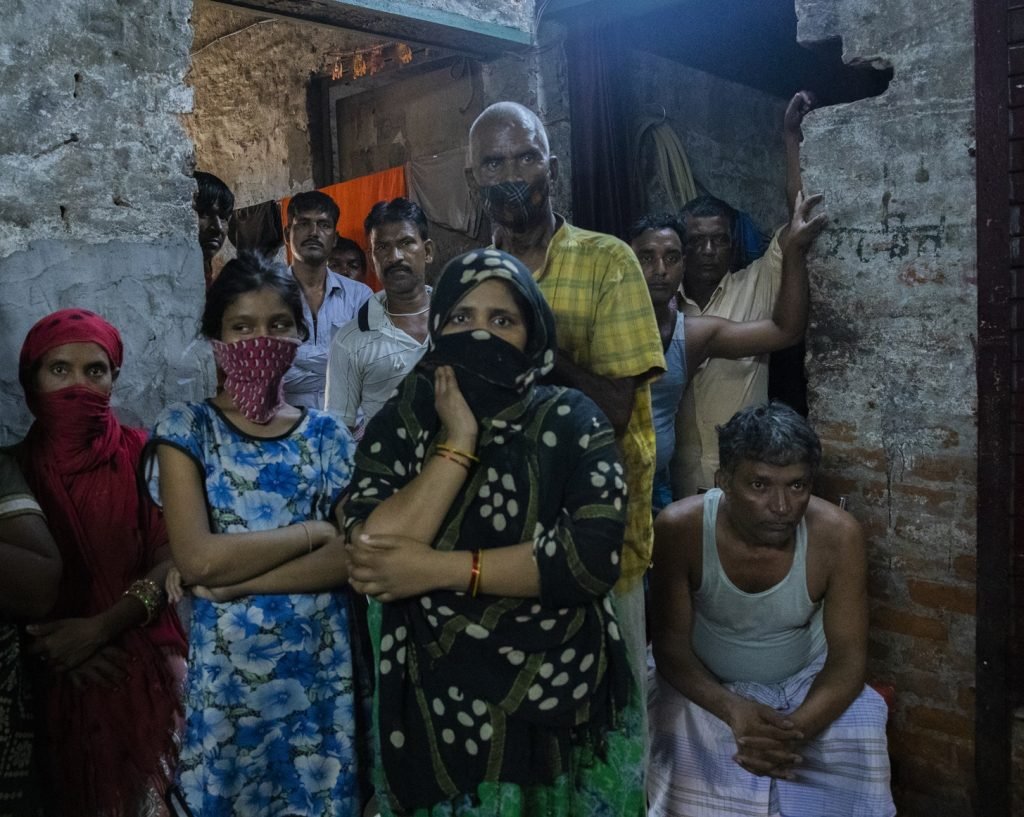
However, eviction cases don’t always have a successful outcome. In a recent case, despite iProbono filing multiple urgent petitions in the Delhi High Court, we couldn’t prevent the demolition of houses at the Gyaspur settlement in South Delhi. It was appalling to witness hundreds of residents lose their homes overnight.
Unfortunately, authorities often demolish homes and destroy vibrant communities without following the due process of rehabilitation established by the law, and without considering the basic human rights of the citizens.
The Impact of Forced Evictions
Residents of informal settlements and ‘slums’ live below the poverty line, and frequent demolitions deepen their despair. Forced evictions not only displace families but also have a serious impact on their health, education, and livelihood.
‘Residents’ or ‘Encroachers’?
The commonly held view about basti residents is that they are ‘encroachers’ with no legal right over the land that they inhabit. This issue is made worse by the notion that the poor do not contribute to the development or the economy of the city, ‘pollute’ the environment and have no right to housing.
The land-owning agencies continue to relentlessly destroy these communities by demolishing their houses – either on the pretext of removing encroachments from their land or by citing environmental concerns.
Every day, thousands of people relocate to Delhi in search of employment. However, the state fails to uphold its constitutional duty to provide affordable and adequate housing to people who migrate to metropolitan cities. This leaves them homeless, without any form of protection. As a consequence, the migrants begin to build their houses on the vacant spaces they find, eventually transforming them into thriving neighbourhoods. The majority of these residents work as daily wage earners on construction sites, as domestic workers in houses, and as street vendors. They contribute towards the economy as responsible citizens of the city. However, this contribution is completely sidelined in the narrative built by land-owning agencies.
What Does the Law Say?
Domestic Legal Framework and Recent Developments in Housing Cases
The right to adequate housing has been recognised by the Indian judiciary in a plethora of cases:
- Olga Tellis & Ors vs Bombay Municipal Corporation & Ors: In 1985, the Supreme Court in a landmark judgment acknowledged that the ‘right to shelter’ is a component of the ‘right to life’ as guaranteed by Article 21 of the Constitution. It was further ruled that only after finding suitable replacement dwellings for the slum and pavement residents could their eviction take place.
- Sudama Singh vs Government of Delhi, 2010: The Delhi High Court stipulated that the relevant authorities must determine who needs to be rehabilitated and relocated and recognise the right to meaningful dialogue prior to an eviction.
- Ajay Maken vs Union of India & Ors: In this case, the Delhi High Court ruled that once a basti is determined to be eligible for rehabilitation, agencies should stop viewing its residents as “illegal encroachers” and develop an appropriate rehabilitation plan.
The Delhi Slum and JJ Rehabilitation and Resettlement Policy 2015 was approved by the Delhi Urban Shelter Improvement Board (DUSIB) in the year 2016. This policy mandates that the bastis that had come up before 01.01.2006 shall not be removed without their residents getting alternate housing. The Draft Protocol of 2016 sets out the process of conducting a proper survey of the residents prior to a proposed demolition drive and lists the steps for the rehabilitation of the displaced residents.
The eruption of a recent conflict between the Union and the state government has halted the rehabilitation processes in some of our ongoing cases. As per a recently introduced scheme, the vacant flats in the resettlement colonies of Delhi, which were earmarked for allotment to eligible families, have now been assigned (on a rental basis) to migrant workers under the Affordable Rental Housing Complex (ARHC) scheme.
The petitioners for some of the ongoing cases are directly affected by the scheme and are waiting to be rehabilitated for years despite having a favourable order. They were stipulated to be rehabilitated long before the ARHC scheme even came into existence.
We are still providing legal representation to residents of two informal settlements whose court-mandated rehabilitation has been delayed due to the scheme.
International Legal Framework
The United Nations has passed multiple covenants, declarations, and resolutions affirming the right to adequate housing, condemning forceful evictions, committing to protecting people from forced evictions, and ensuring that due process of law is followed.
- Article 11.1 of the International Covenant on Economic, Social and Cultural Rights (ICESCR) passed in 1966, declares that “state parties to the present Covenant recognise the right of everyone to an adequate standard of living for himself and his family, including adequate food, clothing and housing, and to the continuous improvement of living conditions”.
- The United Nations Human Rights Council (UNHRC), through a resolution, recommended that “All Governments ensure that any eviction that is otherwise deemed lawful is carried out in a manner that does not violate any of the human rights of those evicted.”
- The Istanbul Declaration on Human Settlements adopted by the UN Conference on Human Settlements (Habitat II) in June 1996 expressly recognises parties’ commitment towards “protecting all people from and providing legal protection and redress for forced evictions that are contrary to the law, taking human rights into consideration; when evictions are unavoidable, ensuring, as appropriate, that alternative suitable solutions are provided.”
India is either a party to or has ratified all the above covenants, declarations, and resolutions and, therefore, is under obligation to recognise the right of citizens to adequate housing and their right against forced evictions.
The Way Forward & iProbono’s Approach
The right to adequate housing and shelter is an essential part of the fundamental right to life guaranteed under the Constitution and is also protected under Delhi’s housing laws. In the current housing scenario, where illegal demolitions and evictions of residents of informal settlements are rampant across Delhi and other cities in India, the role of pro bono lawyers becomes extremely crucial as they not only provide relevant legal support to these residents but also help create a positive narrative about them in front of the judges in the court and before the legal fraternity. They depict their reality without bias and help them access justice.
We at iProbono promote a more compassionate rights-based approach and defend the dignity of the residents of the city no matter which social strata they belong to. We are committed to protecting vulnerable individuals and promoting their right to access decent housing and basic services by representing them in court and advocating for their rights with relevant stakeholders. Our work also includes conducting capacity-building training on housing laws for community workers and housing rights activists by empowering them to fight for their rights.
(*name changed to protect privacy)
[1] Cities of the Poor: A view on Urban Poverty in India. November 21, 2019. The Times of India. Available at: https://timesofindia.indiatimes.com/blogs/in-the-name-of-development/cities-of-the-poor-a-view-on-urban-poverty-in-india/
[2] People in urban slums contribute over 7% of GDP: Study. Oct 16, 2013. The Economic Times. Available at: https://economictimes.indiatimes.com/news/economy/indicators/people-in-urban-slums-contribute-over-7-of-gdp-study/articleshow/24199742.cms




